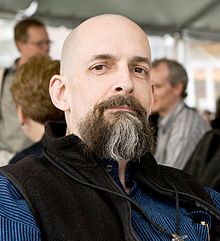Neal Stephenson has made a habit of looking to the future. As an award-winning science fiction author, looking forward is just what he does. He’s the author of several popular novels such as Anathem, Quicksilver, and The Diamond Age. He took time out of his book tour to chat with the The Mission Daily and give us a glimpse into his process: how the modern tech landscape inspires him, how we’re still making myths, and how he never really thought he’d be a writer.
He bases his work off of real-life (or soon-to-be real life) situations. One of his more recent novels, Dodge, is about a billionaire who requests for his body to be preserved after he’d dead, and how his family deals with that request. For Stephenson, this type of reality isn’t that far off: “It’s a reality of the world we’re living in today that there’s, surprisingly large number of these individuals who have amassed a huge amount of money and they are fixtures in the tech business world. We read about them all the time. They have a great deal of freedom of action. I mean, you take, say, Elon Musk, if he gets interested in something, he is able to dive into it and pursue it with a huge amount of resources at his disposal. I feel like that is how things are right now. From a storytelling point of view it’s a convenient way to set up interesting situations. Somebody who’s got that much freedom of action, then whatever they’re interested in, whether it’s a good idea or a bad idea, they’re able to sort of execute on it in a huge way.”
He believes humans are still in the business of myth-making. It’s easy to think of the word “myth” like it’s something that happened centuries ago. But, according to Stephenson, we’re still making stories that they’ll be talking about a millennia from now: “I mean, which reboot of Spider-Man are we on at the moment? When I was a kid, I can remember, I had an album and LP, that was a radio play about Spider Man. It had Doc Octopus, it Dr. Strange, all the same chars. I would listen to it on my dad’s stereo, probably the 1960s. I think it’s totally believable that a thousand years from now Spider-Man will still be a long running character and will get rebooted a few years for a new generation of viewers or whatever they have a thousand years from now.”
He’s honed his process, but thinks you should find your own. “Well, I don’t presume to tell others what they should do. My way is… I work alone, I don’t solicit feedback until I’m done, and then I’m basically getting feedback from a very small number of people. And the process can be a little different for every book. So I tend to kind of reinvent the process a little bit to suit the needs of a particular book. Like in the case of Fall, for example, there was almost no research because it’s all just complete, just making stuff up and writing it down. So there was no need to keep track of a lot of notes and a lot of information about the project. It was just sit down and try to tell a story every day.”
Writing kind of caught him by surprise. He didn’t grow up anticipating that he’d ever have a writing career. Though he’s now a “creative”, he still makes sure to take time away from art. “I grew up in a science and engineering family. I grew up in a small college town in Iowa that it’s just completely devoted to science and technology. That was the oxygen I breathed until I was about twenty years old. And I wasn’t aware that it was unusual. I think I just picked up a kind of science and engineering mentality that is not something to acquire. And then I studied technical subjects when I was in college. Once my writing career got started, I found that I had to do something of a more practice nature every day. Basically the ideal day is just get up, spend two hours writing and spend the rest of the day working on something unrelated.”
To hear more from Neal (and get a glimpse into some of his exciting new projects), check out the whole podcast here.


